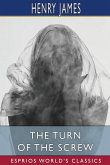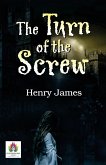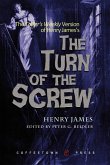he Turn of the Screw is an 1898 horror novella by Henry James that first appeared in serial format in Collier's Weekly magazine (January 27 - April 16, 1898). In October 1898 it appeared in The Two Magics, a book published by Macmillan in New York City and Heinemann in London. Classified as both gothic fiction and a ghost story, the novella focuses on a governess who, caring for two children at a remote estate, becomes convinced that the grounds are haunted.In the century following its publication, The Turn of the Screw became a cornerstone text of academics who subscribed to New Criticism. The novella has had differing interpretations, often mutually exclusive. Many critics have tried to determine the exact nature of the evil hinted at by the story. However, others have argued that the brilliance of the novella results from its ability to create an intimate sense of confusion and suspense within the reader.The novella has been adapted numerous times in radio drama, film, stage, and television, including a 1950 Broadway play, and the 1961 film The Innocents. On Christmas Eve, an unnamed narrator listens to Douglas, a friend, read a manuscript written by a former governess whom Douglas claims to have known and who is now dead. The manuscript tells the story of how the young governess is hired by a man who has become responsible for his young nephew and niece after the deaths of their parents. He lives mainly in London but also has a country house, Bly. He is uninterested in raising the children.The boy, Miles, is attending a boarding school, while his younger sister, Flora, is living at a summer country house in Essex. She is currently being cared for by Mrs. Grose, the housekeeper. Miles and Flora's uncle, the governess' new employer, gives her full charge of the children and explicitly states that she is not to bother him with communications of any sort. The governess travels to her new employer's country house and begins her duties.Miles soon returns from school for the summer just after a letter arrives from the headmaster stating that he has been expelled. Miles never speaks of the matter, and the governess is hesitant to raise the issue. She fears there is some horrible secret behind the expulsion but is too charmed by the adorable young boy to want to press the issue. Soon thereafter, around the grounds of the estate, the governess begins to see the figures of a man and woman whom she does not recognise. These figures come and go at will without ever being seen or challenged by other members of the household, and they seem to the governess to be supernatural. She learns from Mrs. Grose that the governess' predecessor, Miss Jessel, and another employee, Peter Quint, had had a sexual relationship. Before their deaths, Jessel and Quint spent much of their time with Flora and Miles, and this fact has grim significance for the current governess when she becomes convinced that the two children are secretly aware of the ghosts' presence.Later, without permission, Flora leaves the house while Miles is playing music for the governess. The governess notices Flora's absence and goes with Mrs. Grose in search of her. They find her in a folly on the shore of the lake, and the governess is convinced that Flora has been talking to the ghost of Miss Jessel. When the governess finally confronts Flora, the girl denies seeing Miss Jessel and demands never to see the governess again. At the governess' suggestion, Mrs. Grose takes Flora away to her uncle, leaving the governess with Miles, who that night at last talks to her about his expulsion the ghost of Quint appears to the governess at the window. The governess shields Miles, who attempts to see the ghost. The governess tells Miles he is no longer controlled by the ghost and then finds that Miles has died in her arms, and the ghost has gone.
Hinweis: Dieser Artikel kann nur an eine deutsche Lieferadresse ausgeliefert werden.
Hinweis: Dieser Artikel kann nur an eine deutsche Lieferadresse ausgeliefert werden.








